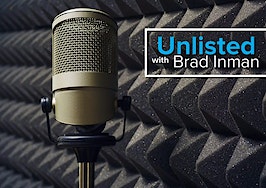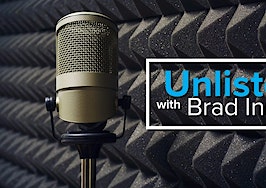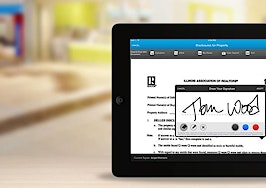- Whether you are buying a home or selling a $3 million software package, it is about people.
- Surround yourself with people who are smarter than you.
- Don’t be afraid to jump into water that is over your head.
- You must open up your heart and be vulnerable to be successful.

Keith Krach
Chairman and CEO of DocuSign, Keith Krach is an MBA, visionary and humble leader who is changing the real estate industry.
In this podcast, Krach shares tips on leadership, relationships, cybercrime and business strategy.
Greetings, Inman readers. I am so, so happy today to have with me the chairman and CEO of DocuSign, a friend of the real estate industry, Keith Krach, who is an entrepreneur, Harvard MBA, and done so many interesting things. And has one killer house in San Francisco that many people that were at Connect had an opportunity to visit.
He’s a charitable guy, supporting all kinds of interesting causes. And he’s revolutionizing the real estate industry. Welcome, Keith.
Brad, hey, thanks so much for being on. It’s a privilege.
So Keith, we are gonna spend some time talking about some of the stuff you’re pioneering to make the world paperless, which is so, so important, and has been a vision of mine for a long time. So I feel like we’re partners.
But I also want the real estate community to know this wonderful guy, Keith Krach, who people don’t know very well.
You have a Harvard MBA, and right now everyone’s talking about how you don’t need an education to be an entrepreneur, and you’re both. How important are degrees and college educations?
You know Realtors always struggle — should I get a degree? Would I be a better Realtor? Or should they follow Bill Gates and Zuckerberg and drop out of college. How do you put all that together?
My grandmother always used to say, the most important things in life are not written in a book. And my father used to say, a degree and $0.25 will get you a cup of coffee in Cleveland.
But with all that being said, I’ll tell you what: I learned so much in school, and the thing I learned the most is really how to learn, a process for learning and having a sense of curiosity.
And if I look back, getting an engineering degree from Purdue, I learned the scientific method. Being logical, I learned that there’s one right answer.
At Harvard Business School, I learned that there’s always more than one right answer. And I also learned, because there was a case study method, and 50 percent of your grade was based on class participation, it’s not necessarily what you know, it’s what you think of in time.
But one of the greatest things out of my academic career is really making a tremendous group of friends. And a lot of people say, man, Krach, you’ve got a great network, LinkedIn, blah, blah.
It’s not the network, it’s friendships. And as you kind of get older, I’m always amazed.
[Tweet “Keith Krach: ‘It’s not the network, it’s friendships.'”]
And I always say this about my buddies: These guys are running Fortune 500 companies, doing all kind of things. And those friendships are life-lasting, and you learn a lot of life lessons, like there’s always somebody in the room smarter than you. And it really gives you a chance to exercise your mind and attack problems.
But more than anything else, it’s just kind of that endless quest for learning, ’cause you’re never done.
That makes sense, Keith. Now you have a humility to you, and I think the Midwest must play a part in that.
And you always seem willing, and I guess it’s key to relationships to be willing to, you’re dynamic and you’re charismatic, but you’re also humble.
Where does that come from? And were you always that way, or did that come with age? Or did that come from the sweet Midwest, as we call it?
I think it probably does come from my upbringing. That side of it — I was never really gifted as a child, so it was all about, how hard do you work, to be honest with you. And I just think it’s good, old-fashioned Midwest values, in terms of courtesy, and respect and fidelity to principle. And you can always learn something from somebody.
And one of the things I think that’s key, are these friendships in life and in business. And I think one of the keys is, how quick can you get to somebody’s core. Because you don’t have a lot of time.
And I think the way to do that is you’ve gotta open up your heart, you gotta be authentic, you gotta be vulnerable. So, yeah, after a while it just becomes habit for me.
Yeah, it’s interesting — that wouldn’t be the CEO mantra 20 years ago. You had to be harsh and tough and it’s a different approach.
Let me ask you about this. You are a master at relationships. It was really evident to me.
And let’s talk to my tech entrepreneurs here, who seem to sometimes think we can solve everything with a new piece of code or with an application. You’re an entrepreneur. You’re in the tech sector.
You went to Silicon Valley at a young age after a marvelously successful track record at GM, youngest VP ever in history. What do my tech entrepreneurs need to know about the importance of personal relationships and your success? And how should they think about that, versus “tech can solve all the woes of the world.”
I think when we look at ourselves in the real estate industry, we’re in the people business. And it’s all about relationships, it’s all about trust.
And that is true for tech companies as well. I mean, I always stand up in front of all the employees at DocuSign and say, “Guys, we’re in the people business.”
What we do is, we enable them to have speed, accuracy, a great customer experience, all that. But it’s that people side — because whether you’re buying a home, or whether you’re doing a $25 million software deal, you have to trust the person across the table from you. And I just think that is just so fundamental.
Yeah, and what’s the key to building relationships? Is it putting yourself out there, is it how you approach people? What are the keys to those relationships?
I think it’s first and foremost listening, and having empathy, and being curious. And to really get somebody, you have to get inside their core.
And so, you’ve got to be willing to put that out there as well in terms of being vulnerable. And sometimes that might come back to bite you, but I’d say 99 percent of the time, that’s the catalyst for getting things. To really building a friendship.
Exactly.
And long-term relationships.
Yes, absolutely.
And you know my wife, Meadow — she always calls me a people collector. I mean, I’d go back and see the guys I used to play football with in Ohio and everywhere and…
Did you play football in Ohio State or Purdue?
No, I didn’t play for Ohio State. Back in high school, I was the old baseball pitcher at Purdue, but sometimes people say, “Man, I haven’t talked to them in 10 years or 20 years.” It’s never too late to call up an old friend. It’s never too late to say thank you. It’s never too late to say “I’m sorry.”
Yeah, there you go, reconcile your past.
My dad had a habit. We were from the Midwest, and his last 20 years, every week he said a prayer for someone from his past. And we said, “What’s that about, dad?”
And he said, “Well, remember the guy that mowed our lawn? He always wanted to talk to me, and I tried my best, but I didn’t pay attention to him sometimes.”
Yeah.
“And so I prayed for him today.” I mean, it was — we have to do that. And I guess we learn these things as we get older.
Yeah.
Hey, Keith, let’s talk about one other thing. The tech industry and real estate, it feels to me, and you are leading the pack here, that we’re finally getting our act together and smoothing out the transaction and talk about the people business.
This gives Realtors more time to focus on the people side, instead of the administrative paper side.
Yes.
If this is a four-quartered game, are we at halftime, are we still in the first quarter, or how much further do we have to go before we finish this game out?
I think we’re probably still in the first quarter, probably the latter end of the first quarter, because the things coming down the road in terms of technology, some of those things that we talked about, Brad, in the fireside chat.
In terms of smart contracts, in terms of really making the agents and brokerages, just so they can focus on what’s most important. And that’s spending time with their clients. So take the drudgery out of it.
And also, in this world of privacy and security and empowering, whether they’re the consumer side or whether they’re the agents, is to be able to transact anything, anytime, anywhere, on any device securely. So I think you’re gonna see some great developments.
That’s why we doubled down in our real estate vertical, and this whole area of automating lead-to-close.
And then also integrating it seamlessly with the title side, with the mortgage side, and leveraging our strengths in terms of all the big banks and title companies.
Keith, one thing that came up at our event, towards the close — we had a really savvy broker, Angela Raab from Indianapolis, who talked about how she’s automating the back-end. And of course, she uses DocuSign.
And then we also had Pat Stone, who’s done a lot of innovative work in this area. And then we also had Austin Allison, who is doing some interesting work as well on the back end.
But Pat said something that really kind of startled us all. And he said, “Anything you’ve read about cyber crime, it’s 10 times worse.” And someone else at the event talked about how they’re getting hacked 24 hours a day.
Yeah.
And not successfully, but they’re trying. And tell me this, ’cause I’m a journalist at heart, curious, and I’ve been worried about this issue, and I think we’re all a little naive: What’s really going on?
This must be a really tough thing for you, running a safe and secure platform. And what the heck is this country gonna do about it, because it’s everybody’s problem.
Yeah, and at the core, that is what DocuSign is focused on. And that is the trust aspect of these transactions. And that is one of the reasons why the xDTM standard is so important because it’s that quantifiable, measurable, auditable aspects in terms of privacy, security, availability, interoperability, enforceability, compliance.
And we’ve invested hundreds of millions of dollars in it, because these are people’s most important agreements. So the encryption technology, the security, is critical.
Yeah, and it seems like we really, every company, every government agency, every individual really has got to fortify themselves, to get some of these threats.
And this wiring of money problem we had in real estate was just scary, because there’s no recourse, there’s no insurance — if you mistakenly, because someone attacked you, do a wire transfer to the wrong account of a criminal, there’s no insurance for it, there’s no bank backing you up. And some of these things are gonna start, I think, melting into the real world in ways we don’t like.
Anyway, that’s why we need companies like DocuSign, to provide that safety and security for Realtors.
Let me end with this, Keith. I always compare the everyday Realtor to the entrepreneur, in the beginning of all my conferences I ask people to stand up that paid to get there using their personal credit card, and that’s always a Realtor.
They’re not on payroll. They don’t get health insurance. They don’t get free vacation pay. And it’s the entrepreneur who’s bootstrapping their company with a credit card. These kind of startup hustlers that have to just put it together every day, without any job security.
Yeah.
What’s a tip to them of how to be successful? What is it that they need to do to succeed — and you’re a role model for that — what would that be?
I guess I would break it down to three things: Even if you’re an individual entrepreneur or an individual agent, surround yourself with people who are smarter than you. I think, well, I made a living out of that.
But I also think, it’s what I especially tell the young guys, don’t be afraid to jump in water over your head. ‘ Cause you’re gonna learn how to swim. You’ve gotta take risks. And from your failures is where you learn the most.
[Tweet “Keith Krach: ‘From your failures is where you learn the most.””]
And I guess that the last thing is a lot of times, people say, “Hey, Keith, man, you’re really lucky.”
And I go, “Yeah, man, I guess I’m just lucky.”
But I know what the definition of luck is. It’s when opportunity meets preparation. And for the preparation part, and what you do when nobody’s looking is, I think, the key to making your own luck.
I love that, Keith, I think you just nailed it for all of us. And you’ve created a lot of luck for yourself by being there and being present, and also being generous with your ideas and with your money.
And I want to thank you. You’re one of our gifts to the industry.
I’d like to close this out by giving a big round of applause out there from our listening audience to Keith Krach, the chairman and CEO of DocuSign.
Let’s talk again soon, Keith, and thank you very much for being here today.
You got it, Brad. Thank you so much, I deeply appreciate it.










